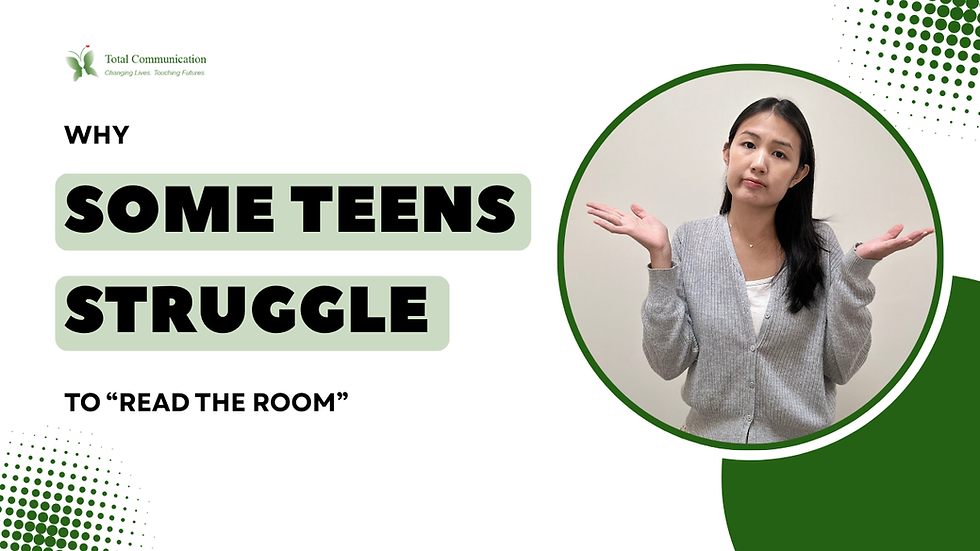Why Your Child May Be Talking Less And What That Actually Means (A Realistic Guide for Parents in Singapore)
- Jerlyn Tong

- Nov 21, 2025
- 4 min read

When Speech Doesn’t Come As Expected
Every parent remembers the first time they hear “mama” or “papa.” It’s emotional, it’s exciting… and for some parents, it’s delayed. Painfully delayed.
We often meet parents who whisper things like:
“My child is already 3… why is he still so quiet?”
“She used to babble more… now she barely says anything.”
“He talks, but mostly repeats things.”
“Everyone says ‘boys talk late’, is that even true?”
Here’s the honest truth: Children communicate in different ways. But meaningful communication - verbal or non-verbal - should grow with time. When it doesn’t, it’s not a sign to panic. It’s a sign to pay attention.
Let’s unpack what “talking less” can really mean, and how you can support your child without getting overwhelmed by Google searches and well-meaning aunties.
Talking Less Doesn’t Always Mean “Not Learning”
Speech development isn’t linear. Children often grow in bursts - sometimes language, sometimes movement, sometimes emotional regulation. Some kids need more time coordinating motor skills needed for speech. Others understand far more than they can express.
What matters is progress, not perfection.
But yes, there are signs when “less talking” becomes a communication delay.
Common Reasons Children Talk Less (And What Parents Often Miss)
Motor Planning Difficulties: Speech isn’t just thinking of words, it’s coordinating tiny muscles in the tongue, lips, and jaw. If this system is delayed, speech becomes exhausting.
Sensory Processing Differences: Children who are overwhelmed by sound, visual clutter, or movement may “shut down” verbally.
Limited Joint Attention: If your child rarely looks when you point, or doesn’t share attention easily, verbal language becomes harder to develop.
Minimal Exposure to Back-and-Forth Interaction: Kids learn speech through turn-taking, not through screens. A tablet can do many things, teaching meaningful communication isn’t one of them.
Neurodevelopmental Conditions: Autism, ADHD, GDD, and language disorders can all affect the natural flow of talking.
Anxiety or Overwhelm: Some children go “quiet mode” when they’re overstimulated or unsure of expectations.
Regression: If speech reduces suddenly, it’s important to get professional support early.
Signs That Suggest Your Child’s Speech Delay Needs Attention
Look out for:
limited babbling by 12 months
few or no words by 18 months
less than 50 words by age 2
difficulty combining words by age 3
unclear speech beyond the usual toddler mispronunciations
mostly scripted speech
difficulty following simple instructions
limited interest in communicating
frustration or behaviour issues during communication
If multiple points sound familiar, it’s worth getting an assessment.
Meaningful Speech vs. Memorised Speech
A child repeating “Cookies… cookie monster… cookie cookie cookie!” might sound cute, but repetition isn’t always functional.
Parents often confuse:
Meaningful Speech: Child uses words intentionally to request, comment, ask, label.
Memorised Speech (Scripting / Echolalia): Child repeats phrases from videos, songs, or adults, without full understanding.
Both are parts of development, but meaningful use is the key milestone.
What You Can Do at Home (That Actually Works)
Here’s the practical, everyday stuff, not the Pinterest version.
Speak in Short, Clear Phrases: Children understand and imitate better when the language is simple. Instead of: “Can you please bring me your bottle from the table?” Try: “Get the bottle.”
Narrate Daily Routines through Declarative Language: Bath time, meal time, going out, narrate it all. Kids learn through hearing consistent language.
Pause More: Say something… then wait. Children need processing time. Silence is golden here.
Follow Their Interests: If your child loves buses, talk about buses. Interest = engagement = communication.
Reduce Background Noise: Too much sensory load shuts down verbal attempts.
Use Gestures Along With Words: Point. Wave. Show. Gestures build language pathways.
Encourage Any Form of Communication: A point, a picture, a sound respond like it matters. Because it does.
How Total Communication Supports Children Who Talk Less
Our therapists look beyond counting words. We assess:
social interaction
sensory regulation
oral motor abilities
joint attention
expressive/receptive language skills
communication intent
play skills
Then we build a structured plan to support progress.
Play-Based Language Therapy: Kids learn fastest when therapy feels fun, not forced.
Evidence-Based Strategies: From Hanen principles to naturalistic language teaching, we use proven techniques.
Parent Coaching: Your everyday interactions matter more than any clinic session. We show you exactly how to integrate communication into routines.
AAC Options: If speech is delayed, AAC supports communication, it never replaces it.
Sensory-Informed Support: A regulated child can communicate. An overwhelmed one can’t.
Parents often tell us, “He’s finally trying to talk more.” “She feels more confident using words.” “That frustration is slowly reducing.”
That’s what meaningful progress looks like.
When Should You Seek Professional Support?
If you notice:
slow progress
regression
limited attempts to communicate
frustration during communication
unclear speech for their age
difficulty understanding instructions
no improvement after trying at-home strategies
…it’s time for a proper assessment.
Early support doesn’t pressure your child, it opens communication pathways.
Ready to Support Your Child’s Speech & Language?
Our team at Total Communication offers evidence-based speech and language therapy tailored to each child’s developmental profile.
Book a consultation to get clarity on your child’s speech development.
Prefer a gentle start?
Message our team, we’ll guide you through your options. Call/WhatsApp: +65 9115 8895
Want structured support? Explore our programmes.
Your child can learn to communicate and the right support can make the journey easier for both of you
Tags: speech delay Singapore, late talker Singapore, speech therapy for children Singapore, language delay signs, why child not talking, toddler not talking Singapore, early intervention speech therapy, Total Communication Singapore, child communication milestones





Comments